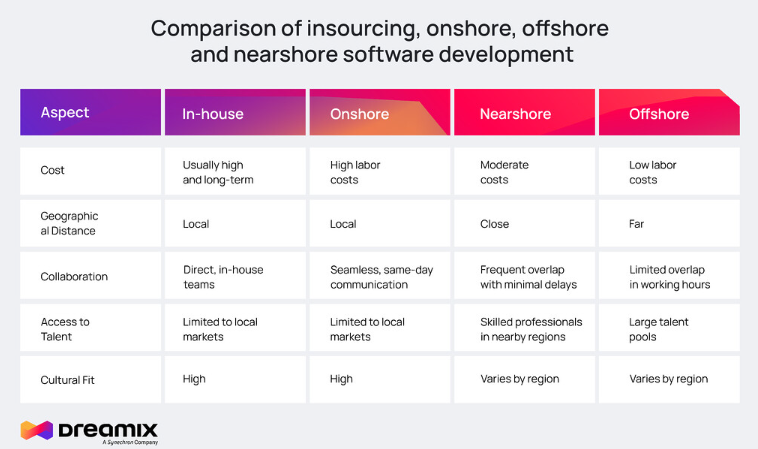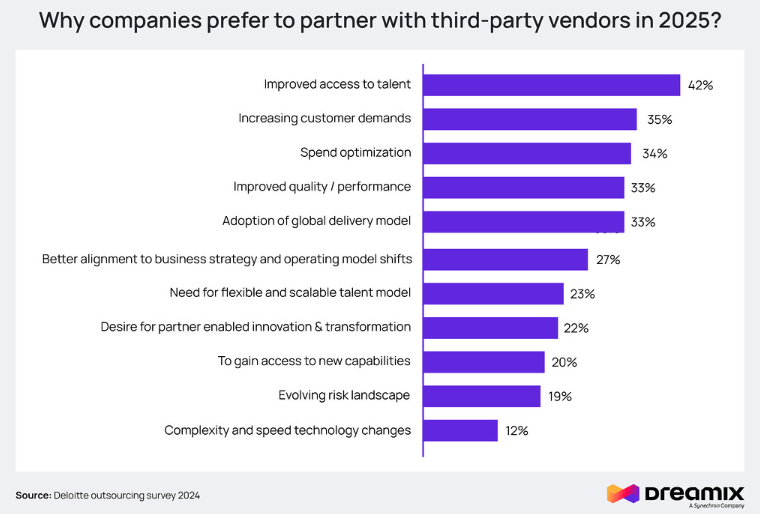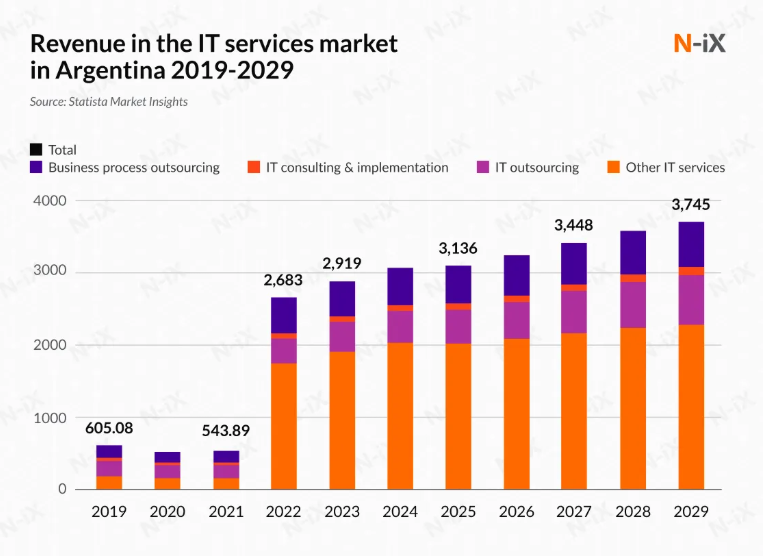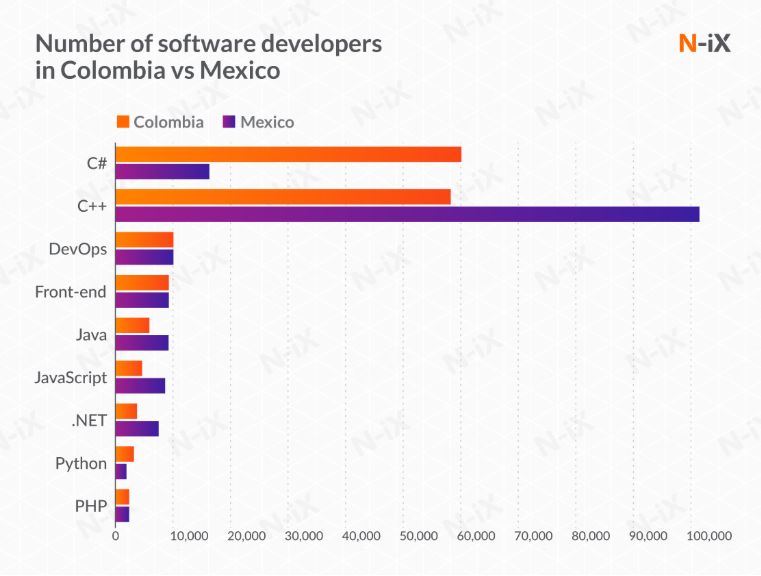
Specialized Nearshore Services: Agile and AI Development by SKM Group

Nearshore Software Development Outsourcing is the strategic delegation of software engineering tasks to external teams located in neighboring or nearby countries. It’s not just about saving money—it’s about alignment. Unlike offshore outsourcing, which can introduce friction due to time zone disparities, nearshoring enables a shared working day, faster communication, and more fluid collaboration.
As SKM Group, we’ve seen that companies turn to nearshoring not just for convenience, but because proximity enhances control without sacrificing flexibility. You get dedicated experts working in your region’s business hours, speaking your language—both linguistically and culturally.
When you're navigating the rapid cycles of Agile Nearshore Development or experimenting with the emerging possibilities of Nearshore AI Development, nearshore models provide a critical edge.
You benefit from real-time syncs, faster sprint reviews, and immediate feedback loops. For AI, where iteration and learning are continuous, being in a near-identical time zone is not a luxury—it’s a strategic lever. Nearshoring also reduces project lag, minimizes miscommunication, and increases ownership among remote developers who feel more embedded in your ecosystem.
Let’s be clear—onshore, offshore, and nearshore each have their place. But nearshore finds the sweet spot.
Offshore teams, often located across the globe, may offer lower rates but can lead to time lag, cultural gaps, and coordination issues. Onshore teams offer cohesion and cultural alignment, but usually at a much higher price point. Nearshore outsourcing provides the balance: cost-efficiency without compromising on synchronization or quality.

Specialized projects—whether AI-driven platforms or Agile-based MVPs—require expertise that’s hard to grow in-house, fast. You might not need a full AI department permanently. You might just need a highly-skilled team for a 6-month NLP deployment. That’s where Nearshore Software Development IT Outsourcing excels.
You can ramp up talent quickly, tailor teams to specific tech stacks, and transition smoothly into your existing development cadence. And when you work with a firm like SKM Group, you're not just hiring developers—you’re extending your product capability without the overhead.
Time zone alignment isn’t a buzzword—it’s a catalyst for productivity. Agile methods require regular standups, sprint reviews, backlog grooming, and demos. You can’t afford to wait 12 hours for a question to be answered.
When your developers work in adjacent time zones, you build momentum. Communication flows. Decisions happen in real-time. And proximity supports occasional in-person meetings, strengthening the team dynamic.
What is Agile Nearshore Development?
Agile Nearshore Development combines the responsiveness of Agile methodology with the regional alignment of nearshoring. You work with a dedicated team—outside your company, but within your working hours—who iteratively delivers product value in sprints.
Unlike traditional outsourcing, where deliverables are static and timelines fixed, Agile nearshore teams evolve with your needs. You adapt together, driven by business value and user feedback.
How Agile Practices Enhance Nearshore Collaboration
Agile isn’t just a framework—it’s a mindset. It promotes autonomy, responsibility, and flexibility. When you apply it in a nearshore setup, you unlock the best of both worlds.
With daily syncs, retrospectives, and demos, communication becomes habit, not exception. Nearshore Agile teams share your priorities in real time. You avoid documentation bottlenecks, instead gaining live insight into development progress and risks.
When SKM Group partners with clients on Agile nearshore projects, we often embed our product managers and QA specialists directly into your ceremonies. This builds trust, speeds up decision-making, and ensures consistent alignment across cycles.
Advantages of Agile Nearshore Teams for Software Projects
Speed, agility, and insight—Agile nearshore teams bring all three. They help you move fast without breaking things.
You can test ideas quickly, fail faster, and pivot when the market demands it. You reduce overhead tied to long-form documentation and make room for iterative learning. And you maintain control—not just over the product vision, but over the process that brings it to life.
Here's how this plays out in practice:
Using Nearshore Agile Development for Faster Time-to-Market
Getting to market isn’t a race—it’s a relay. Each handoff matters. With Agile Nearshore Development, your team can work with a velocity that matches your business tempo. You avoid asynchronous delays and redundant planning sessions.
By cutting lead time between ideation and implementation, nearshore Agile squads help you outpace competitors. You can seize market opportunities when they’re hot—not after six months of internal wrangling.
SKM Group builds Agile teams that plug directly into your ecosystem, ready to co-define priorities and ship fast. Whether it's a consumer app, a logistics dashboard, or an AI-enhanced recommendation engine—we align velocity with vision.
Key Features of Agile Nearshore Development Partnerships
Great nearshore partnerships don’t just happen. They’re engineered.
What sets an effective Agile nearshore relationship apart is not just talent—but structure. At SKM Group, we emphasize full-cycle collaboration, transparent communication, and mutual accountability.
Expect structured onboarding, dual timezone rituals, and tools tailored to Agile cadence. We co-own the backlog, co-review each iteration, and commit to joint sprint goals. Your business priorities become our delivery benchmarks.
Nearshore AI Development involves outsourcing your artificial intelligence initiatives to geographically close expert teams. These aren't just developers—they're data scientists, ML engineers, and AI architects, capable of building scalable, intelligent systems tailored to your business needs.
Whether it’s predictive analytics, computer vision, or NLP, nearshore AI specialists help you harness machine intelligence without the overhead of building an internal data lab from scratch.

AI is experimental by nature. You need feedback loops, flexible iterations, and constant training cycles. Nearshore teams make this feasible.
You get proximity for real-time alignment, shared cultural understanding for ethical decisions in AI design, and fast iteration on complex models. With minimal time lag, you can validate hypotheses, retrain models, and deploy updates quickly.
Plus, Nearshore AI Development often offers access to talent that’s not only affordable but highly specialized. In regions like Central and Eastern Europe, for instance, you’ll find PhDs in machine learning with real-world fintech and medtech experience—ready to accelerate your AI roadmap.
AI isn’t theoretical anymore—it’s operational. Companies across sectors are deploying nearshore AI teams to create real value.
From smart logistics and fraud detection to real-time pricing engines and generative content tools, AI is redefining industries. In healthcare, models assist diagnostics. In retail, algorithms personalize customer journeys. In finance, AI predicts risk.
If you’re not actively investing in AI today, you’re already behind. And if you don’t have internal capability, Custom Software Development Outsourcing gives you a fast lane to relevance.
Proximity for Real-Time Collaboration
In a high-velocity product environment, timing is everything. When your developers sit within a 1–3 hour time difference, you get real-time collaboration without late-night calls or disjointed handovers.
This synchronicity streamlines Agile rituals and enables joint problem-solving. You avoid the “24-hour delay trap” that often plagues offshore workflows, where every feedback cycle takes an entire day. Nearshore partnerships, by contrast, operate at your rhythm.
Cost-Effectiveness Compared to Onshore Options
Let’s talk numbers. Building an in-house team in the U.S. or Western Europe comes with a heavy financial load—salaries, benefits, infrastructure, hiring cycles. Nearshoring gives you a way to scale talent with comparable quality at a fraction of the cost.
For the same budget, you can often double your engineering throughput by nearshoring. And you avoid long-term commitments—nearshore teams offer scalability, flexibility, and a pay-for-what-you-need model.
At SKM Group, we’ve helped clients reduce engineering costs by up to 40% while maintaining enterprise-grade output.

Access to Specialized Talent in Agile and AI
Modern digital products require more than just full-stack developers. You need specialized talent—data engineers, AI researchers, DevOps experts, Agile product owners. These roles are expensive and scarce locally.
Nearshore regions, especially in Central and Eastern Europe or Latin America, are booming with niche tech expertise. These ecosystems produce top-tier talent trained in international standards, fluent in English, and aligned with Agile culture.
You don’t just hire hands—you gain brainpower.
Reduced Language and Cultural Barriers
Let’s be honest—offshore teams often struggle with nuance. Communication breakdowns happen, and subtle instructions can get lost in translation. That’s where nearshoring shines.
You get cultural proximity—shared business etiquette, similar holidays, overlapping work philosophies. English fluency is often part of the educational foundation in top nearshore regions. This bridges the gap between strategy and execution.
Scalability to Meet Evolving Project Demands
Your software needs may shift week to week. You might need 5 backend developers today and a cloud security specialist tomorrow.
Nearshore teams offer modular scalability. You can flex the team size up or down without restructuring your org. SKM Group enables plug-and-play resource allocation, adapting sprint-by-sprint to your goals, timelines, and funding cycles.
Agile Development for Product Design and Iteration
Early-stage product development is chaotic by nature. You’re shaping the vision, testing hypotheses, iterating UI flows. This process thrives with Agile Nearshore Development, where teams can co-design in real-time, prototype quickly, and push usable builds at the end of each sprint.
Nearshore teams aren’t just executors—they become co-creators. They help you run design sprints, refine MVPs, and ship iterative value.
AI Development for Data-Driven Applications
If your app touches data—any kind of data—then AI should be on the roadmap. Whether it’s behavioral analytics, churn prediction, or content classification, nearshore AI experts can help you build solutions that learn and improve over time.
This isn’t just about ML algorithms. It’s about architecture, model governance, data pipelines, and production deployment. Nearshore AI Development gives you access to mature, full-stack AI capabilities without having to build them internally.
Cloud-Based Software Solutions via Nearshore Teams
Cloud-native software development is another prime candidate for nearshoring. From Kubernetes clusters to CI/CD automation, nearshore teams can architect scalable, secure, and resilient cloud environments tailored to your application needs.
At SKM Group, we help clients migrate legacy systems to the cloud, build microservice architectures, and optimize costs using intelligent cloud infrastructure.
Custom Software Development Outsourced to Nearshore Partners
No two businesses are alike—and neither are their software needs. Nearshore teams are ideal for custom software development that requires domain expertise, iterative feedback, and tight collaboration.
You define the vision. We shape the architecture. Together, we build future-proof software products that deliver value fast.

Maintenance and Support Services with Nearshore Teams
Maintenance is often underestimated—but critical. Post-launch, you need reliable support: bug fixing, feature enhancements, API updates, platform upgrades. Nearshore support teams provide continuity, fast response, and product insight.
Your product stays secure, performant, and updated—without stretching your internal bandwidth.
Step 1: Establishing Clear Communication Protocols
Communication makes or breaks distributed teams. From day one, define your channels—Slack for messaging, Jira for task tracking, Zoom for meetings. Set rules around availability, standups, and feedback cadences.
At SKM Group, we embed our teams into your tools and routines. There’s no “us vs. them.” There’s just one team.
Step 2: Choosing the Right Nearshore Partner
Don’t choose based on cost alone. Vet the partner’s expertise, past work, technical stack, and cultural alignment. Look for a company with structured onboarding, long-term clients, and proven Agile experience.
Ask for code samples. Run pilot sprints. Demand transparency. Nearshoring only works if trust and delivery go hand in hand.
Step 3: Setting Agile-Friendly Workflows and Tools
Agile tools are the glue. Whether it’s Jira, Confluence, GitHub Actions, or Figma—make sure your workflows are integrated and accessible across teams.
Use kanban boards for clarity, sprint planning for rhythm, and retrospectives for improvement. Shared visibility leads to shared ownership.
Step 4: Defining Service Level Agreements (SLAs)
SLAs aren’t optional. Define expectations around uptime, bug resolution, code quality, and velocity. Set quantitative metrics so you can measure performance objectively.
SLAs aren’t just about accountability—they provide psychological safety. Everyone knows what’s expected and what “success” looks like.
Reinvent your IT foundation with future-ready solutions from SKM Group: Explore our IT services.
Step 5: Monitoring Progress with Regular Feedback Loops
Feedback isn’t a meeting—it’s a culture. Schedule regular reviews, hold retrospectives, share KPIs. Use continuous feedback to tune the process.
At SKM Group, we implement bi-weekly sprint reviews and monthly strategic syncs with our clients. It keeps us aligned, adaptable, and proactive.
Overcoming Integration Issues with Existing Teams
Integrating external teams can disrupt internal harmony if not managed carefully. Ensure your nearshore teams participate in your standups, product planning, and QA processes from day one.
Use a single source of truth for documentation and tasks. Let teams co-own deliverables, not just execute instructions.
Ensuring Security in AI Development Projects
AI workflows often deal with sensitive data. Compliance with GDPR, HIPAA, or SOC 2 must be built-in from the start. Encryption, anonymization, and secure APIs aren’t optional—they’re foundational.
Choose a nearshore partner with enterprise-grade security protocols and a clean legal track record.
Managing Quality Control Across Nearshore Teams
Quality assurance is not just QA testing. It starts with good code, peer reviews, automated CI pipelines, and consistent documentation.
Enforce coding standards. Use tools like SonarQube, GitLab, or Cypress. Establish a shared definition of “done” and enforce it sprint by sprint.
Mitigating Risks in Long-Distance Collaboration
Distance creates risk—but also opportunity. Use hybrid work principles: written clarity, video-first communication, and cross-time-zone empathy.
Build redundancy into your teams. Document tribal knowledge. Avoid reliance on a single point of contact.
Navigating Legal and Regulatory Differences
Don’t overlook regulatory compliance. Understand employment laws, intellectual property rights, and NDAs in the partner’s country.
Work with a legal team experienced in international contracts. At SKM Group, we offer standardized legal frameworks to simplify the paperwork so you can focus on the product.
Expansion of Agile Nearshore Development Practices
Agile is no longer a buzzword—it’s the norm. Nearshore teams are embracing Agile at scale, including SAFe, LeSS, and Spotify models. Expect deeper integration and faster ramp-up times.
The Rise of Nearshore AI Centers of Excellence
AI isn’t going away. Regional hubs are emerging as AI powerhouses, combining academic talent with startup energy. SKM Group is actively investing in cross-border AI labs to accelerate innovation for our clients.
Integration of Cloud and AI in Nearshore Partnerships
Cloud + AI is the new stack. Nearshore teams will increasingly offer both infrastructure automation and intelligent application layers. This synergy will drive smarter, scalable systems.
Focus on Sustainability in Nearshore Development
Clients are asking: how green is your code? Nearshore vendors will need to align with ESG goals—optimizing data centers, improving energy efficiency, and reducing carbon footprint in the dev lifecycle.
Enhanced Collaboration Through AI-Powered Tools
Expect tools that write code, triage bugs, generate documentation, and even facilitate retrospectives using NLP. AI won’t just be the product—it’ll power the way we build it.
If you're looking to innovate, Nearshore Software Development Outsourcing isn't just a staffing decision—it’s a strategy. By combining the iterative strength of Agile Nearshore Development with the intelligence of Nearshore AI Development, you unlock speed, insight, and resilience.
At SKM Group, we help companies like yours scale smarter. We don’t just deliver software—we co-create platforms, systems, and experiences that move markets. When you're ready to build what’s next, we’re here to help.
Specialized nearshore services combine the advantages of proximity with expertise in advanced technologies such as AI, automation, and Agile development. They provide customized solutions tailored to specific industries and organizational needs. Nearshore teams offer technical precision with enhanced collaboration due to time zone alignment. These services enable faster delivery without sacrificing quality or security. As businesses evolve digitally, nearshore specialization is becoming a cornerstone of innovation.
Agile methodologies allow nearshore teams to integrate seamlessly with clients’ workflows. Daily stand-ups, sprint reviews, and retrospectives ensure constant communication and alignment. Proximity enables real-time interaction, making Agile ceremonies more efficient. This fosters transparency, accountability, and rapid problem-solving. Agile nearshore models deliver the speed and adaptability that modern projects demand.
AI development within nearshore partnerships includes machine learning, natural language processing, and data automation. These teams can create intelligent systems such as chatbots, predictive models, or recommendation engines. Because of the close collaboration, clients can guide model training and validation effectively. Nearshore AI teams also ensure compliance with data privacy regulations in shared jurisdictions. This combination of skill and proximity accelerates digital intelligence adoption.
Sectors like healthcare, finance, logistics, and retail benefit significantly due to their complex data and compliance needs. Nearshore teams offer secure handling of sensitive information while developing tailored digital solutions. For example, fintech firms leverage nearshore partners for AI fraud detection and customer analytics. Manufacturing companies use them for automation and predictive maintenance. Industry-specific expertise makes nearshore specialists invaluable in high-regulation environments.
Challenges include limited talent availability in smaller regions and higher costs compared to offshore options. Data localization laws can also complicate cross-border collaboration. Cultural differences, though smaller than in offshore setups, may still impact communication. Businesses should establish clear governance models and frequent check-ins. Strong partnerships thrive on openness, structured communication, and mutual trust.
Top-tier providers follow international standards like ISO 27001 and use secure cloud environments. They employ DevOps and automated testing to maintain consistent quality across iterations. Regular code reviews, penetration testing, and data encryption ensure compliance with global regulations. Nearshore providers also invest in continuous training and process optimization. This guarantees both innovation and reliability in long-term cooperation.
The future of outsourcing lies in proximity, expertise, and collaboration rather than just cost savings. Specialized nearshore teams combine domain knowledge with advanced technologies like AI, cloud, and analytics. They deliver high-value solutions faster, with fewer communication barriers. As digital transformation accelerates, this model offers the perfect balance of agility and reliability. In 2025 and beyond, nearshore specialization will define the new standard for strategic IT partnerships.
Our agile methodology ensures flexibility and delivers real-world results. See how we work.
Discover more
Comments